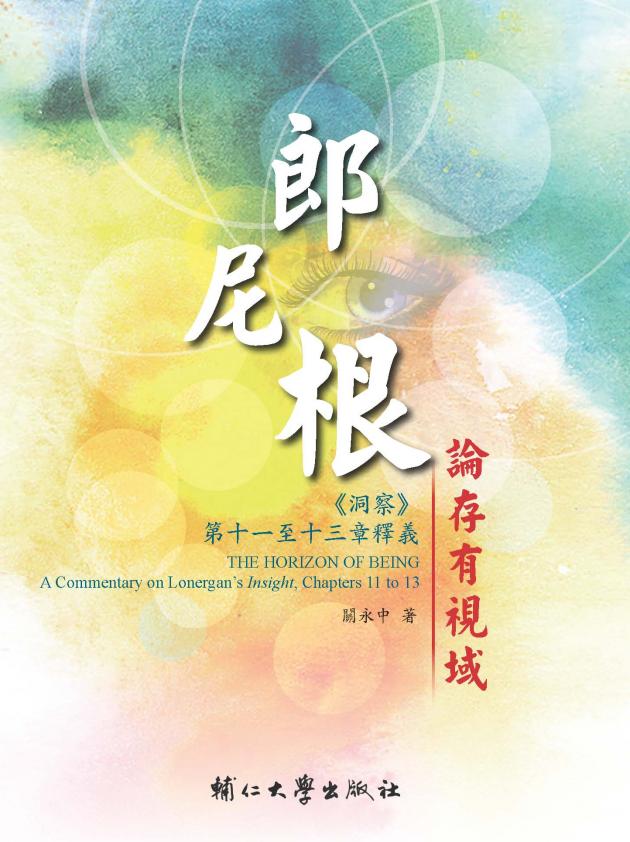郎尼根論存有視域—《洞察》第十一至第十三章釋義
郎尼根論存有視域—《洞察》第十一至第十三章釋義
作者:關永中
出版年份:2019/12
語言: 中文
叢書名號:輔仁大學研究叢書222
ISBN:9789578843455
定價:250元
出版年份:2019/12
語言: 中文
叢書名號:輔仁大學研究叢書222
ISBN:9789578843455
定價:250元
作者:關永中
出版年份:2019/12
語言: 中文
叢書名號:輔仁大學研究叢書222
ISBN:9789578843455
定價:250元
出版年份:2019/12
語言: 中文
叢書名號:輔仁大學研究叢書222
ISBN:9789578843455
定價:250元
出版品說明
郎尼根以三個核心問題──「心智問題」、「知識問題」、「形上問題」──來演繹出《洞察》全書的脈絡,「心智問題/ Gnoseological Question」主要被回應在《洞察》的前十章的行文內,可見於幾年前所出版之《郎尼根的認知理論──《洞察》卷一釋義》。
《郎尼根論存有視域──《洞察》第十一至十三章釋義》探討企圖化解接踵而來的「知識問題/Epistemological Question」。「知識問題」:「認知中為何有如此的步驟產生?」郎尼根的回應是:因為有「認知者」在向「存有視域」開放,二者間的符應遂造就成「客觀義」,其中重點略述如下:
「認知者/ Knower」──人是「認知者」,他不單認知外物,且意識到自己在進行認知,在求知中肯定自己為「認知主體」。
「存有視域/ Horizon of Being」──人並非是一個封閉的獨我,相反地、他是身處世界,意向著萬事萬物的整體,總稱為「存有視域」。
「客觀性/ Objectivity」──當「認知者」的認知內容「符應」著被認知的境界,則呈現客觀知識,邁向整全的真理。
再者,「認知者主體」因應著其「經驗、理解、判斷、抉擇」過程,而演繹意識上的延伸;也就是說,「主體」在「感性知覺」中孕育「經驗」、建構出「經驗意識/ Empirical Consciousness」;又在心智上產生「理解」、而成就「智性意識/ Intelligent Consciousness」;也藉合理「判斷」、而形成「理性意識/Rational Consciousness」;更透過對善惡的「抉擇」、而自我塑造為「理性自覺意識/ Rational Self-Consciousness」。
【目錄】
前言(Foreword)
序(Preface)
目錄(Contents)
認知者的自我肯定──郎尼根《洞察》第十一章釋義(“Self-Affirmation of the Knower: A Commentary on Lonergan’s Insight, Chapter Eleven”)
內容摘要(Abstract)/關鍵詞(Key Words)
引言(Introduction)
第一節:意識(Consciousness)
第二節:認知中的三重意識(Three Levels of Consciousness)
第三節:意識的統一性(The Unity of Consciousness)
第四節:意識之統一性的被給予(The Unity as Given)
第五節:自我肯定(Self-Affirmation)
第六節: 「自我肯定」乃「事實判斷」(Self-Affirmation as Judgment of Fact)
第七節:描述與解釋(Description and Explanation)
第八節:再強調「不可能徹底被修正」的意義(The Impossibility of Revision)
第九節:從「事實判斷」之可能性透視「自我肯定」(Self-Affirmation in the Possibility of Judgments of Fact)
第十節:與康德派分析作對比(Contrast with Kantian Analysis)
第十一節:與相對主義者的分析作對比(Contrast with Relativist Analysis)
結語(Conclusion)
存有想念──郎尼根《洞察》第十二章釋義(“The Notion of Being: A Commentary on Lonergan’s Insight, Chapter Twelve”)
內容摘要(Abstract)/關鍵詞(Key Words)
引言(Introduction)
第一節:為存有下定義(A Definition for Being)
第二節:存有的想念、概念、觀念三分法初議(A Preliminary Distinction of the Notion, the Concept, and the Idea of Being)
第三節:存有想念(The Notion of Being)
第一小節:客體面(An Unrestricted Notion)
第二小節:主體面(A Spontaneous Notion)
第三小節:整體面(An All-Pervasive Notion)
第四小節:核心面(The Core of Meaning)
第五小節:困惑面(A Puzzling Notion)
第四節:存有概念(The Concept of Being)
第一小節:上古形上理論(Ancient Metaphysical Theories)
第二小節:中古形上理論(Medieval Metaphysical Theories)
第三小節:近世形上理論(Modern Metaphysical Theories)
結語(Conclusion)
客觀性之義蘊──郎尼根《洞察》第十三章釋義(“The Notion of Objectivity: A Commentary on Lonergan’s Insight, Chapter Thirteen”)
內容摘要(Abstract)/關鍵詞(Key Words)
引言(Introduction)
第一節:首要客觀性(The Principal Notion of Objectivity)
第二節:絕對客觀性(Absolute Objectivity)
第三節:規範客觀性(Normative Objectivity)
第四節:經驗客觀性(Experiential Objectivity)
第五節:客觀義特質檢討(Characteristics of the Notion)
結語:《洞察》前十三章的總檢討(Conclusion: A Review of Chapter Thirteen)
參考資料選錄(Selected Bibliography)
《郎尼根論存有視域──《洞察》第十一至十三章釋義》探討企圖化解接踵而來的「知識問題/Epistemological Question」。「知識問題」:「認知中為何有如此的步驟產生?」郎尼根的回應是:因為有「認知者」在向「存有視域」開放,二者間的符應遂造就成「客觀義」,其中重點略述如下:
「認知者/ Knower」──人是「認知者」,他不單認知外物,且意識到自己在進行認知,在求知中肯定自己為「認知主體」。
「存有視域/ Horizon of Being」──人並非是一個封閉的獨我,相反地、他是身處世界,意向著萬事萬物的整體,總稱為「存有視域」。
「客觀性/ Objectivity」──當「認知者」的認知內容「符應」著被認知的境界,則呈現客觀知識,邁向整全的真理。
再者,「認知者主體」因應著其「經驗、理解、判斷、抉擇」過程,而演繹意識上的延伸;也就是說,「主體」在「感性知覺」中孕育「經驗」、建構出「經驗意識/ Empirical Consciousness」;又在心智上產生「理解」、而成就「智性意識/ Intelligent Consciousness」;也藉合理「判斷」、而形成「理性意識/Rational Consciousness」;更透過對善惡的「抉擇」、而自我塑造為「理性自覺意識/ Rational Self-Consciousness」。
【目錄】
前言(Foreword)
序(Preface)
目錄(Contents)
認知者的自我肯定──郎尼根《洞察》第十一章釋義(“Self-Affirmation of the Knower: A Commentary on Lonergan’s Insight, Chapter Eleven”)
內容摘要(Abstract)/關鍵詞(Key Words)
引言(Introduction)
第一節:意識(Consciousness)
第二節:認知中的三重意識(Three Levels of Consciousness)
第三節:意識的統一性(The Unity of Consciousness)
第四節:意識之統一性的被給予(The Unity as Given)
第五節:自我肯定(Self-Affirmation)
第六節: 「自我肯定」乃「事實判斷」(Self-Affirmation as Judgment of Fact)
第七節:描述與解釋(Description and Explanation)
第八節:再強調「不可能徹底被修正」的意義(The Impossibility of Revision)
第九節:從「事實判斷」之可能性透視「自我肯定」(Self-Affirmation in the Possibility of Judgments of Fact)
第十節:與康德派分析作對比(Contrast with Kantian Analysis)
第十一節:與相對主義者的分析作對比(Contrast with Relativist Analysis)
結語(Conclusion)
存有想念──郎尼根《洞察》第十二章釋義(“The Notion of Being: A Commentary on Lonergan’s Insight, Chapter Twelve”)
內容摘要(Abstract)/關鍵詞(Key Words)
引言(Introduction)
第一節:為存有下定義(A Definition for Being)
第二節:存有的想念、概念、觀念三分法初議(A Preliminary Distinction of the Notion, the Concept, and the Idea of Being)
第三節:存有想念(The Notion of Being)
第一小節:客體面(An Unrestricted Notion)
第二小節:主體面(A Spontaneous Notion)
第三小節:整體面(An All-Pervasive Notion)
第四小節:核心面(The Core of Meaning)
第五小節:困惑面(A Puzzling Notion)
第四節:存有概念(The Concept of Being)
第一小節:上古形上理論(Ancient Metaphysical Theories)
第二小節:中古形上理論(Medieval Metaphysical Theories)
第三小節:近世形上理論(Modern Metaphysical Theories)
結語(Conclusion)
客觀性之義蘊──郎尼根《洞察》第十三章釋義(“The Notion of Objectivity: A Commentary on Lonergan’s Insight, Chapter Thirteen”)
內容摘要(Abstract)/關鍵詞(Key Words)
引言(Introduction)
第一節:首要客觀性(The Principal Notion of Objectivity)
第二節:絕對客觀性(Absolute Objectivity)
第三節:規範客觀性(Normative Objectivity)
第四節:經驗客觀性(Experiential Objectivity)
第五節:客觀義特質檢討(Characteristics of the Notion)
結語:《洞察》前十三章的總檢討(Conclusion: A Review of Chapter Thirteen)
參考資料選錄(Selected Bibliography)

